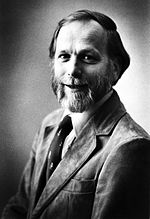J. Michael Bishop
J. Michael Bishop | |
|---|---|
 J. Michael Bishop | |
| Born | John Michael Bishop February 22, 1936 |
| Nationality | American |
| Alma mater | Harvard University |
| Known for | Oncogene Virus |
| Awards |
|
| Scientific career | |
| Fields | Virology |
| Institutions | |
| Website | profiles |
John Michael Bishop (born February 22, 1936) is an American immunologist and microbiologist who shared the 1989 Nobel Prize in Physiology or Medicine with Harold E. Varmus and was co-winner of 1984 Alfred P. Sloan Prize.[2] He currently[when?] serves as an active faculty member at the University of California, San Francisco.[3][4][5][6][7]
Education and early life
Bishop was born in Pennsylvania. He attended Gettysburg College as an undergraduate, where he was a brother of the Theta-Pi Zeta chapter of Lambda Chi Alpha fraternity. He later attended Harvard University where he earned an MD in 1962.[citation needed]
Career
Bishop began his career working for the National Institute of Allergy and Infectious Diseases, a part of the National Institutes of Health. He then spent a year working for the Heinrich Pette Institute in Hamburg, Germany before joining the faculty of the University of California, San Francisco in 1968.[4] Bishop has remained on the school's faculty since 1968, and was chancellor of the university from 1998-2009.[6] He is Director of the Bishop Lab.[8]
Awards and honors
Bishop is best known for his Nobel-winning work on retroviral oncogenes. Working with Harold E. Varmus in the 1980s, he discovered the first human oncogene, c-Src. Their findings allowed the understanding of how malignant tumors are formed from changes to the normal genes of a cell. These changes can be produced by viruses, by radiation, or by exposure to some chemicals.[5][9][10][11]
Bishop is also a recipient of National Medal of Science in 2003.[7] That same year, his book "How to win the Nobel Prize: An Unexpected Life in Science" was published. He was elected Foreign Member of the Royal Society (ForMemRS) in 2008.[1]
Archival Collections
The University of California, San Francisco Archives and Special Collections houses a collection of J. Michael Bishop papers, including his laboratory research notebooks, writings, photographs, and other material.[12]
References
- ^ a b "Professor J Michael Bishop ForMemRS". London: Royal Society. Archived from the original on 2015-10-21.
- ^ NCI Visuals Online: Image Details. Visualsonline.cancer.gov. Retrieved on 2013-11-24.
- ^ Nobel autobiography
- ^ a b Autobiography on UCSF Website Template:Wayback
- ^ a b Nobel Prize press release
- ^ a b Susan Desmond-Hellmann named UC San Francisco chancellor
- ^ a b National Medal of Science details
- ^ Bishop Lab. Hooper.ucsf.edu. Retrieved on 2013-11-24. Template:Wayback
- ^ Michael Bishop archival collection at UCSF
- ^ J. Michael Bishop at AccesExcellence.org
- ^ J. Michael Bishop's lecture: "Cancer: The rise of the genetic paradigm"
- ^ Calisphere J. Michael Bishop Collection: https://calisphere.org/collections/26395/
- American biologists
- Members of the United States National Academy of Sciences
- American immunologists
- American microbiologists
- American Nobel laureates
- American virologists
- Gettysburg College alumni
- Harvard Medical School alumni
- Nobel laureates in Physiology or Medicine
- National Medal of Science laureates
- University of California, San Francisco faculty
- 1936 births
- Living people
- People from York, Pennsylvania
- Foreign Members of the Royal Society
- Recipients of the Albert Lasker Award for Basic Medical Research
